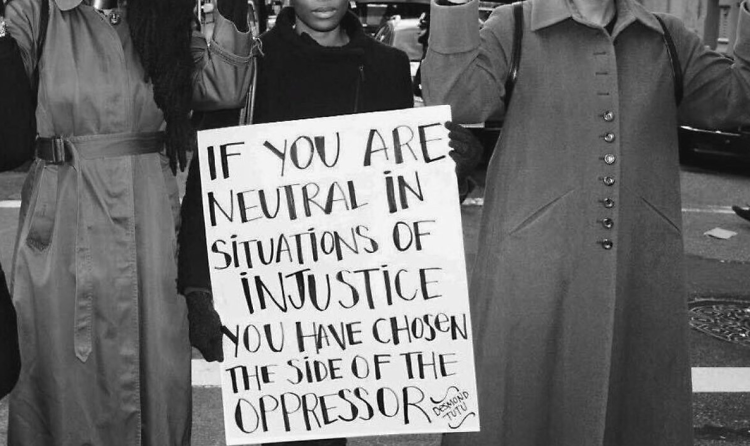
I am writing this essay as a white-passable, straight-passable, able-bodied, cisgender woman. While I do not identify as white or heterosexual I acknowledge those privileged statuses along with the others from which I benefit, and attempt to check them.
Being a white ally is problematic. The idea that people of color need white people to help them plays into the white-savior complex that denies POC their agency and further displaces their voice. But, as POC suffer under systemic oppression, white people benefit from and perpetuate the system that allows for such oppression. Every day that you (the hypothetical white or white-passing person reading this post) go about your daily life - responding to #blacklivesmatter posts with #alllivesmatter, gripping your purse closer to your body when a black man enters the elevator, blindly walking past when you see a POC being frisked by the cops in the subway; you not only play neutral in the face of oppression, but support the system that allows people in positions of power to murder, mistreat, and abuse POC. You are complicit.
Do not force your POC friends and acquaintances to teach you how to be a better ally. This is not their job. They are in pain. They are hurting and they do not owe you the time or mental energy to teach you how to be a decent fucking human. If they are angry with white people, do not respond defensively. They have every reason to be angry with white people. If what they say or post on social media offends you, check yourself.
Do your own research. If you are confused as to how you can support the POC in your life and the Black Lives Matter movement, there are resources out there for you to read. It is your job to educate yourself. There are more articles out there to educate white people on how to be a good ally or to understand (when they really should be able to rely on their own humanity as a basis of doing so) the oppression POC face than white people deserve. (I am internally divided on the politic of writing another essay in the vein of how to "be a good ally" for people who can sympathize with an animal but not with another human but am hoping that this essay resonates with someone with whom previous essays had not resonated.)
Do not speak over POC. Right now, this space is not your space. You do not walk through the world fearing for the lives of your family and yourself, and so you, as empathetic as you may try to be, will never fully comprehend the pain, hurt, and weight POC feel. When a POC speaks, listen. Their voice matters more than yours. When you silence a POC by speaking over them or by interjecting and making a space feel unsafe, you are using your privilege to oppress them. Listening is one of the best things you can do.
While it is valid to feel saddened and pained by the constant tragedies, it is important to recognize that the pain POC feel is intensified by the greater proximity of the hurt to their own lives. Make space for people of color to express their pain. You are not the focus. Listen and step back.
Respect the hurt your POC friends and acquaintances feel. If one of your POC friends cancels plans because they feel unsafe and need to practice self-care; listen, be understanding, respect their space. If one of your POC coworkers cannot come to work because the tragedies this past weekend are weighing too heavily on their heart; listen, be understanding, respect their space. If a POC tells you what you are saying hurts them, or that your actions hurt them; stop, listen, be understanding, respect their space.
As a privileged white or white-passing person living in a system that disproportionately benefits you, not only disadvantaging POC, but allowing for the systemic murder of your fellow citizens, your job is to listen, to try to understand, to respect their space.
*As a person in a position of privilege I recognize that there are important issues I have failed to acknowledge and that there may be problematic statements in my essay. I welcome critique but also recognize that I am responsible for self-educating and while I would like feedback, I am not entitled to it. If you feel the need/desire to comment or respond to my essay I would appreciate that and would also prefer that we maintain the comments section as a safe space free of microaggressions and hate-speech. I also recognize that it is problematic to have written an article for white/white-passing people as a white-passable person and apologize if I have upset anyone by inserting myself into the dialogue.*
[Photo via @bipartisanism]


.jpg)
.jpg)



.jpg)
.jpg)
.jpg)


.jpg)
.jpg)
.jpg)